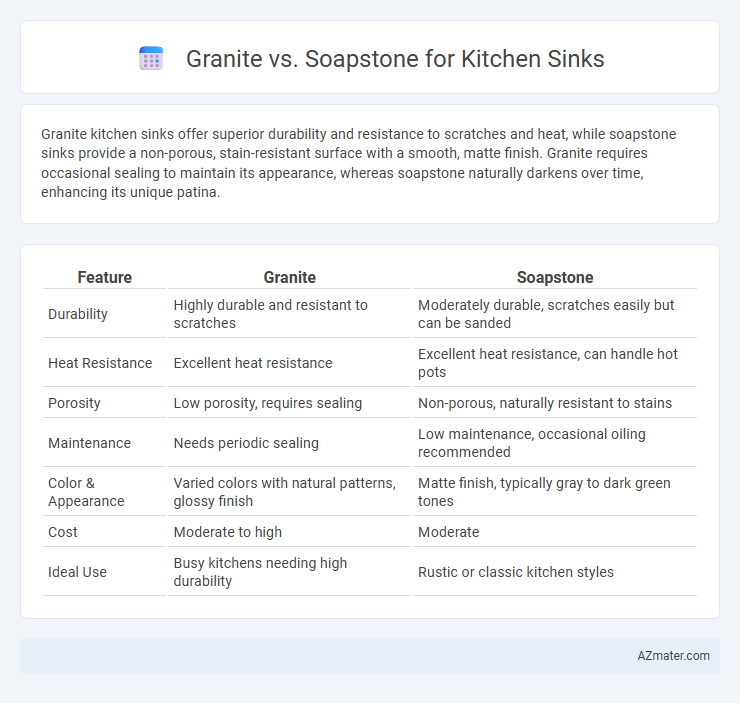Granite kitchen sinks offer superior durability and resistance to scratches and heat, while soapstone sinks provide a non-porous, stain-resistant surface with a smooth, matte finish. Granite requires occasional sealing to maintain its appearance, whereas soapstone naturally darkens over time, enhancing its unique patina.
Table of Comparison
| Feature | Granite | Soapstone |
|---|---|---|
| Durability | Highly durable and resistant to scratches | Moderately durable, scratches easily but can be sanded |
| Heat Resistance | Excellent heat resistance | Excellent heat resistance, can handle hot pots |
| Porosity | Low porosity, requires sealing | Non-porous, naturally resistant to stains |
| Maintenance | Needs periodic sealing | Low maintenance, occasional oiling recommended |
| Color & Appearance | Varied colors with natural patterns, glossy finish | Matte finish, typically gray to dark green tones |
| Cost | Moderate to high | Moderate |
| Ideal Use | Busy kitchens needing high durability | Rustic or classic kitchen styles |
Introduction: Granite vs Soapstone Kitchen Sinks
Granite kitchen sinks offer exceptional durability, resistance to scratches, and a polished, elegant appearance, making them a popular choice for modern kitchens. Soapstone sinks provide a naturally smooth texture with heat and stain resistance, developing a unique patina over time that adds character. Both materials require minimal maintenance but differ in hardness and aesthetic appeal, influencing the choice based on kitchen style and usage needs.
Material Overview: Granite and Soapstone Explained
Granite is a natural igneous stone composed mainly of quartz, feldspar, and mica, prized for its durability, heat resistance, and varied color patterns, making it a popular choice for kitchen sinks and countertops. Soapstone, a metamorphic rock primarily made of talc, has a smooth, soft texture and excellent resistance to stains and bacteria, providing a unique, matte finish that darkens with age. Both materials offer strong resistance to heat and wear, but granite requires sealing to prevent stains, while soapstone's non-porous nature makes it inherently more resistant to moisture and chemical damage.
Durability Comparison: Granite vs Soapstone
Granite kitchen sinks offer exceptional durability with high resistance to scratches, heat, and stains, making them ideal for heavy use and longevity. Soapstone sinks, while also durable and heat-resistant, are softer and more prone to developing a patina and minor scratches over time, which can be easily restored with sanding. Both materials provide strong durability, but granite is generally tougher and requires less maintenance compared to soapstone.
Aesthetic Appeal: Styles and Colors
Granite kitchen sinks offer a wide range of styles and colors, including speckled patterns and rich earth tones that complement both traditional and modern kitchens. Soapstone sinks feature a smooth, matte finish with natural veining in shades of gray, black, and green, providing a timeless and rustic aesthetic. The choice between granite and soapstone depends on whether homeowners prefer varied color options or the understated elegance of natural stone hues.
Maintenance Requirements
Granite kitchen sinks demand regular sealing to prevent stains and maintain their polished look, while soapstone sinks naturally resist stains and require only occasional oiling to enhance their color and prevent drying. Soapstone's non-porous surface minimizes bacterial growth and simplifies cleaning, contrasting with granite's more porous texture that can harbor microbes if not properly sealed. Choosing between granite and soapstone hinges on the homeowner's willingness to invest time in sealing granite versus the low-maintenance care soapstone offers.
Stain and Scratch Resistance
Granite kitchen sinks offer superior scratch resistance due to their dense, hard surface composed of natural stone and resin, resisting everyday wear and maintaining a polished look. Soapstone sinks, while softer, provide exceptional stain resistance thanks to their non-porous, natural stone structure that repels liquids and reduces discoloration from common kitchen substances. Both materials deliver durability, but granite excels in resisting scratches, whereas soapstone is favored for its stain resistance and ability to develop a unique patina over time.
Heat and Chemical Resistance
Granite kitchen sinks offer exceptional heat resistance, withstanding high temperatures without damage, making them ideal for hot pots and pans. Soapstone sinks provide superior chemical resistance due to their dense, non-porous composition, resisting acids and harsh cleaners without staining. Both materials excel in durability, but granite's heat tolerance is unmatched, while soapstone offers greater protection against chemical corrosion.
Cost Analysis: Granite vs Soapstone Sinks
Granite sinks typically cost between $300 and $700, while soapstone sinks can range from $500 to $1,200, reflecting their natural durability and aesthetic appeal. Installation expenses for both materials vary depending on sink size and complexity, but soapstone often requires more specialized labor, increasing total costs. Long-term maintenance factors also impact overall value; granite is more resistant to staining and scratching, potentially reducing repair costs compared to the softer, more porous soapstone.
Environmental Impact
Granite kitchen sinks offer durability with minimal environmental impact due to their natural stone composition and long lifespan, reducing frequent replacements. Soapstone sinks, although softer, are highly sustainable, sourced from natural quarries, and often require less energy-intensive processing. Both materials support eco-friendly kitchens, but soapstone's lower maintenance and chemical-free sealing process provide distinct environmental advantages over granite.
Which Kitchen Sink Material Should You Choose?
Granite kitchen sinks offer exceptional durability and scratch resistance, making them ideal for heavy use and maintaining a sleek appearance over time. Soapstone sinks provide a natural, heat-resistant surface with a smooth, matte finish that resists staining and develops a unique patina, adding character to kitchen aesthetics. Choosing between granite and soapstone depends on your preference for hardness and maintenance; granite requires less upkeep while soapstone demands periodic oiling to preserve its look.

Infographic: Granite vs Soapstone for Kitchen Sink
 azmater.com
azmater.com